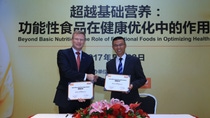Collaborative innovation for personalized nutrition

Be it customized tours, sneakers or bottle design, there is a “customization” trend emerging in the consumption field. According to a January 2017 report by global market research company Mintel, a “one-size-fits-all” approach is becoming less relevant as customization is fast becoming a consumer expectation.
So is it for the health and wellness market. Physical condition and lifestyle vary from person to person, resulting in different demands for nutrition. Therefore, personalized solutions based on specific health needs or through diagnostic tools and devices are also transitioning to the mainstream.
To better promote the concept of personalized nutrition in China, By-Health, the country’s leading nutritional supplement company, is working with upstream and downstream industry, as well as scientific academies, to build a personalized nutrition industry alliance, with the end market as the orientation. As a global leading supplier of nutrient raw materials, BASF is actively involved.
Personalized nutrition is the practice of carrying out safe and efficient individual nutrition intervention so as to maintain health and effectively prevent and control disease.
In a recently published paper by Celis-Morales et al.1, a six-month intervention showed that advice on personalized nutrition delivered to a sample of 1,269 adults resulted in larger and more appropriate changes in dietary behaviour versus a conventional approach. Tailor-made interventions are not just improving quality of life, they are also gaining traction as an innovative approach to prevent disease.

At the consumer end, personalized nutrition is an emerging trend. “We see data validation from the research in a mature market such as the United States. Consumers are willing to pay for personalized nutrition, and the market demands have been sufficient to support the development of personalized nutrition industry,” said Dr. Felix Zhang, Director, Nutrition & Health Research Center for By-Health. “Personalized nutrition focusing on individual demand is bound to become an important aspect of nutritional science and disease prevention.”
In 2015, therefore, By-Health upgraded its positioning from a single dietary supplement supplier to a comprehensive nutrition solution provider.
However, personalized nutrition is still in its infancy in China, while related research and industrialized results are still insufficient. “Personalized nutrition is a topic that has just come to the public’s attention in the past two years,” said Zhang. “The fundamental research and perception from consumers here lags far behind those of developed markets such as Europe or the U.S. for over 10 years.”
The lag in recognition in the domestic market is only one thing; the implementation also faces enormous technical challenges.
On one hand, the human body is complex and people have diversified choices and demands for food and nutrients. Even for an individual, with factors such as time and environment change, the demand for nutrition change increases the difficulty in developing personalized nutrition plans.
On the other hand, there is a lack of unified perception within industry on the individual health database and standards. In the actual operation, personalized nutrition requires technologies such as data tracking and collection, precision medicine and detection technology, and even phase I and II human experiment modelling to obtain individual health data. Only based on these technologies can we obtain individual data, and only by comprehensive data accumulation can an individual health database and health standards be established. In the current market situation, the monitoring of different data points belongs to different areas of scientific research involving scientific research, product R&D and application units.
“The core of a personalized nutrition R&D strategy is collaborative innovation,” said Zhang. Therefore, By-Health decided to partner with materials suppliers, scientific research institutions, medical institutions and other stakeholders to build a personalized nutrition industry alliance, integrating R&D, production and education. The alliance will integrate resources effectively and carry out R&D activities and solution development focusing on the application in the end market.
.jpg)
“The core of a personalized nutrition R&D strategy is collaborative innovation.”
Dr. Felix Zhang, Director, Nutrition & Health Research Center for By-Health
Nutritional products with clear functions and mechanisms are an important part of personalized nutrition. Therefore, the design of related products is among the top priorities of By-Health’s R&D strategy. Due to the complexity of personalized nutrition, By-Health has placed higher requirements on raw materials. A supplier with leading technology and comprehensive competence is in urgent need.
With its demands in raw materials and technical difficulties, By-Health turned to BASF. After listening to customers’ demands, Leon Chen, Senior Manager, Human Nutrition, Nutrition and Health, BASF, became excited. “By-Health and BASF share a common vision in providing the right nutrients to the right people at the right time. We are willing to share our experience in this field, work closely together and help our customer achieve its market place and business goals.”
“We are willing to share our experience in this field, work closely together and help our customer achieve its market place and business goals.”
Leon Chen, Senior Manager, Human Nutrition, Nutrition and Health, BASF
According to Chen, BASF has anticipated the trend of personalized nutrition for some time. In recent years, the company has developed solutions for improving daily dietary nutrition and life quality of the elderly through a global R&D platform and professional knowledge network, and is a global market leader in personalized nutrition. It is able to provide customized raw materials for By-Health on personalized nutrition solutions.
In May 2017 in Beijing, the two companies signed a 10 year R&D strategic cooperation agreement. The deal calls to fully leverage their respective advantages in products and raw materials, and to carry out technical cooperation and industrialized projects for personalized nutrition solutions.

BASF is now actively working with By-Health on two projects: customized vitamins and nutritional products for old people with sarcopenia. Since individual demands for vitamins are different, BASF will help By-Health develop vitamin products that meet consumers’ personalized needs. BASF will consider the product from perspectives of raw materials, end products and compliance scope. As for the R&D of personalized nutrition products targeting sarcopenia, BASF will participate in cooperative efficacy experiments to explore the effect of conjugated linoleic acid on sarcopenia. In addition, the companies will conduct regular exchanges in market insights and trends for a sound go-to-market strategy, thus actively promoting personalized nutrition.
The participation of BASF will bring advantages to the alliance. Human Nutrition, Nutrition and Health, BASF has invested in a global R&D team to support relevant product development. “We have R&D professionals in Germany, Denmark, Singapore and other places,” said Betty Lu, Technical Manager, Nutrition and Health, BASF. “All regions work under the shared R&D platform and resources, hence the competence improves.”
The advantage of BASF is more. “The promotion of personalized nutrition needs cross-discipline cooperation. Similarly, the development of raw materials also needs the joint effort from multiple units,” said Lu. “Besides Human Nutrition, a number of departments including Pharma Solutions are also actively involved.” As a long-established integrated raw materials supplier, BASF is also capable of providing drug excipients. “Nutritional tablets need drug excipients. Pharma Solutions possesses sophisticated medical equipment and is able to produce products that meet the requirements,” she said. “With nutrient raw materials from Human Nutrition, we form a whole package of solutions, thus bringing convenience to customers.”
BASF can also offer guidance for mass production. “Being a market player for years, BASF has accumulated a wealth of experience at all ends of the value chain,” said Lu. “For example, in terms of production process, we have given By-Health a production equipment supplier list with related brands, capacities and advantages/disadvantages for selection.” For the cooperation in personalized nutrition, BASF can offer such support and on-site guidance.
In the view of Zhang, the cooperation with BASF has brought about a positive impact. Such cooperation can reduce R&D and registration time, so as to speed up the entrance time for high-quality raw materials into the China market. In addition, the cooperation will cultivate a coordinative relationship and effectively bring together R&D resources from two sides to develop products that meet the China market needs. “Under the premise of a market-orientated R&D strategy it is a way for the fastest speed and most efficiency,” he said.
Celis-Morales et al., 2016. Effect of personalized nutrition on health-related behaviour change: evidence from the Food4me European randomized controlled trial. International Journal of Epidemiology. DOI: https://doi.org/10.1093/ije/dyw186

